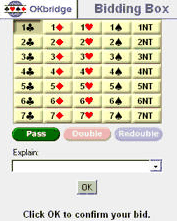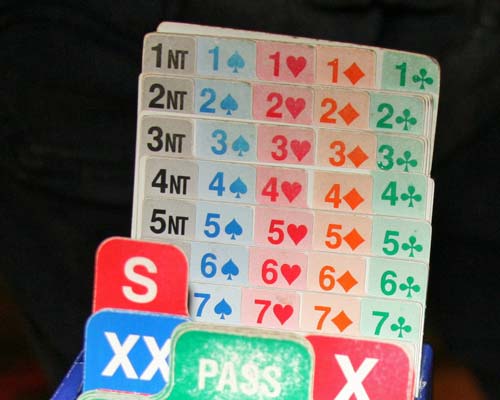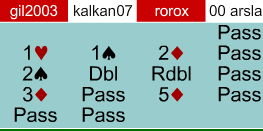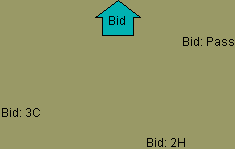Auction
The auction in bridge creates the contract by establishing the declaring side. The declaring side is split up into an active and passive team. The declarer actively plays the hand while the partner of the declarer becomes the passive player known as the “dummy”.
The opponent team has the option of doubling the final contract and the declaring team then has the option of redoubling. The doubling and redoubling increases the scoring for that hand. So as the auction rotates around clockwise each player has to make a call during their turn. The options available to each player as their call is to Bid, Pass, Double or Redouble. The double is available as an option in the event the last call by an opponent was a bid. The redouble is available as an option when the last call by an opponent was a double.
The auction is vital to the scoring of the hand. The double and redouble increases the scoring for the hand so the importance of making the contract or defeating the contract increases.
- Bid
- Pass
- Double
- Redouble
- Rubber Bridge the dealer of the hand shuffles the cards again and deals the hand again
- Duplicate Bridge both pairs score zero points
Bid
- Clubs
- Diamonds
- Hearts
- Spades
Double
The double option in Bridge during the auction phase is a powerful tool to pass information to a partner and to increase the importance of the current bid. The double can only be used after an opponent has made a bid.
The double is meant for a player to use when they believe their opponents will not be able to fulfill the contract.
- Increases opponents score if opponent pair fulfills the contract
- Increases opponents penalty to their score if opponent is unable to fulfill the contract
Redouble
Bidding
The auction portion of playing Bridge is one of the most important aspects of the game. A lot of focus and gamesmanship are placed on creating a challenging contract. The integral part of creating the contract is the increasing bids made by each pair until the point is reached that the opposing pair believes the current bid is likely not to be made.
The bidding occurs during the auction after the cards have been dealt and players have had an opportunity to organize and study their respective hands.
What makes the bidding difficult for each pair is the process of creating a final contract that if fulfilled earns the pair the most possible points while not being too risky that if the contract is unfilled the pair gets penalty points. A high success rate amongst the world’s best Bridge players comes from their ability to communicate their hand strength and hand weaknesses with their partner during the bidding.
To create a good contract, each pair must communicate with each other enough information about their hands. This would be easy if each pair could talk to one another, but in Bridge the information that can be shared with a partner is restricted and that includes verbally discussing their hands. The way partners can communicate with one another is through the calls they make while bidding.
Each call is used as a means to pass information to the partner, such as I have a lot of high diamonds or I have a very balanced hand. During the Contract Bridge auction, the bid is heard and its meaning is understood by the opposing pair. Each call’s meaning will be understood by the opposing pair as the information about the call’s meaning is openly shared at the beginning of the match.
Gradually increasing the stakes of the contract during bidding allows pairs to exchange more information with their partner about their hand. Conversely, quickly increasing the stakes of the contract during bidding reduces the amount of information that will be exchanged with each partner. Both pairs use bidding strategy that aims to gain enough information as quickly as possible to arrive at a favorable contract. By using bidding tactics, careful evaluation of the available information and deduction pairs put forth an effort to push their opponents to bid contracts that are difficult to fulfill while creating contracts themselves that are attainable.
Bridge Bidding Maxims
These common Contract Bridge rules of thumb for bidding are known as Bridge Maxims. Though not always true, most of the time the play suggested should be followed in that situation.
- “Hamman’s Law”: With several bid options in which one is 3NT, you should bid 3NT.
- Major suits before minor suits: Major suits are generally preferred because they score more points and can overbid the opposing pair at the same level.
- Length is better than strength: Having a weak long suit is still stronger than a strong short suit. Long suits make tricks at the end and having them gives your more flexibility and control during the play of the hand.
- Bid cautiously with a misfit, while Bid aggressively with a good fit: Don’t chase a poor contract with a misfit hand between you and your partner, but when you have a good fit go for a high contract.





